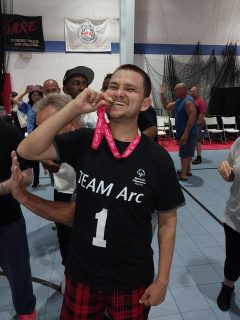How one man went on to change a county – and how his legacy lives on today.
On April 27th, Charles “Bones” Jones will be posthumously awarded the Joseph Holland Lifetime Achievement Award for his unwavering service to the athletic community of Rockland. The RCT sat down with two longtime Special Olympics volunteers – Sue Jones, Bones’ wife, and close friend Nancy Logan to discuss Bones’ legacy and how the Special Olympics continues to provide a place to excel for people with disabilities all over the world.
The Special Olympics began in the 1970s, and was founded by Eunice Kennedy Shriver. What began in Kennedy Shriver’s backyard in Chicago has since blossomed into a worldwide nonprofit organization, providing a space for athletes with disabilities to compete in any of the 193 participating countries.
Bones, whose nickname came from his long and lanky appearance, and his wife Sue met in 1972 while the two worked as recreation therapists at the Letchworth Village Developmental Center. Soon after Bones began working, he was approached by a coworker who shared that he had heard of this new program called the Special Olympics. Bones and Sue decided to give it a shot, and the two got started with track and field events. “I got involved because it was in my marriage contract. Never read it carefully,” teased Sue.
“I was a recreation therapist, he was the supervisor… We lived together, we worked together, we played together, we did Special Olympics.” Bones and Sue saw how beneficial the program was for the institutionalized individuals, and began traveling throughout the state to help expand the program. Bones was particularly involved with basketball and golf after his own personal involvement with the sports.
Nancy credits Bones with really introducing the Special Olympics to the county, saying he was “the only area coordinator the county ever had.” This was an unpaid position, and Nancy and Sue continue to work for the Special Olympics on a strictly volunteer basis.
“He loved, loved, loved the athletes… For somebody that didn’t really talk a whole lot, he knew everybody well,” grinned Nancy.
“He just did things. He just enjoyed life. Enjoyed giving. It was fun. And I think we receive more than we give,” said Sue thoughtfully. When asked what it is that they receive, Sue listed “Fun, joy, happiness, support, thankfulness… unfiltered love.”
“It really is unfiltered,” nodded Nancy. “You get more hugs and more thank yous and more smiles than ever.” The two seem to appreciate the authenticity of the athletes, who they say see directly to the heart of a person. The athletes place emphasis not on clothes or hair or looks, but on how they are treated. Sue spoke on how many of the athletes have been treated poorly by others, both in 1972 and even to this day. The Special Olympics is for many a sanctuary for sportsmanship in the truest sense of the word.
“It’s not about doing well in school, not about reading and writing. It’s about displaying your talents,” said Sue. She emphasized how for many people with disabilities, a large part of the day is spent focused on what they cannot do. The Special Olympics provides carved out time for the athletes to shine in what they can do. Sue and Nancy shared the story of one athlete who was thrilled to finally be included in the family calendar. He had always been schlepped around to his siblings activities, but never had his own activity to write his own name under. The Special Olympics got him on the calendar.
“[The athletes] want to be part of a team. They want to have friends. And that’s what everybody wants. The Special Olympics gives them the opportunity to be a part of a team and have friendships. Some of them have been on the same team with the same peers for 10 years, 15 years, 20 years… Some athletes just joined us last week,” said Nancy. With about 250 athletes in Rockland County alone, there are many opportunities to bond.
There are still struggles around opportunities for people with disabilities locally and globally. “It amazes me that there are countries where people with special needs are hidden. They’re not allowed to go to school, they’re not allowed to go out in public.” Nancy shared the shock she has received from other countries when she describes her athletes working in restaurants or stores and living full lives. Nancy went on to say that when she attended the Special Olympics in Japan in 2005, the island nation stated that they had no special needs students in the entire country.
Women with disabilities often have to face even more hurdles than their male counterparts. Nancy described a team from Bhutan who struggled for three years to accumulate paperwork and gain funding from their government to compete. This all took place while Bhutan supported their male team, no questions asked.
The two recalled when the Special Olympics began in the United States a mere 50 years ago, doctors were telling mothers who gave birth to children with Down Syndrome that their children were useless and would never be a functioning member of society. One such little boy was one of Bones’ first athletes, and he still plays in the Special Olympics as one of their oldest athletes.
Those wanting to support the legacy of Bones Jones and the Special Olympics community can either volunteer or coach Special Olympians. They can also donate to the Bones Jones Foundation to provide direct monetary support to the Special Olympians. The 52nd annual induction dinner, at which Bones will be posthumously recognized, will be taking place on April 27th at the Paramount Country Club in New City from 1:00 p.m. – 5:00 p.m. Please email rocklandspecialolympicsNY@gmail.com to learn more.


You must be logged in to post a comment Login